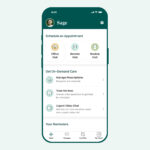The doctor’s bag is an essential tool for healthcare professionals who make house calls. Just like the classic image of a physician arriving at a patient’s doorstep with their trusty bag, modern house call doctors rely on a well-equipped Doctor Bag to provide comprehensive care outside of the traditional clinic setting.
So, what should a doctor keep in their bag to be prepared for a house call? A well-stocked doctor bag is a portable medical office, containing a range of diagnostic and treatment tools. Essential items typically include:
- Basic Supplies: Cotton swabs, various sizes of bandages, and alcohol wipes for wound care and hygiene.
- Diagnostic Equipment: A blood pressure cuff to measure hypertension, a thermometer to check for fever, a pulse oximeter to monitor oxygen saturation levels, and a stethoscope for listening to heart and lung sounds. A diagnostic set, including at least an otoscope for examining ears, is also crucial for initial assessments.
- Injection Supplies: For patients requiring immediate joint relief, having pre-filled syringes with medications like lidocaine and triamcinolone can be very beneficial for on-the-spot treatments for conditions like knee or shoulder pain.
- Blood Draw Equipment: In cases where lab work is necessary, including butterfly needles, tiger-top tubes (SST), and lavender tubes (EDTA) allows for convenient blood sample collection during the house call. This enables timely processing and diagnosis.
House calls are more than just a convenience; they represent a vital aspect of accessible and affordable healthcare, particularly for vulnerable populations. For elderly or disabled patients, leaving home to visit a clinic can be a significant barrier. This is especially relevant in areas with transportation challenges, where house calls bridge the gap in healthcare access.
Studies have consistently demonstrated the positive impact of house calls on healthcare outcomes. They are associated with reduced hospitalizations, fewer emergency room visits, and lower rates of readmission. These benefits not only improve patient well-being but also contribute to significant cost savings within the healthcare system. Programs like the Independence at Home initiative have shown substantial reductions in hospitalizations and healthcare costs through home-based primary care.
The resurgence of house calls reflects a growing recognition of their importance in modern healthcare. While most patient visits occur in clinics, the doctor bag and the practice of house calls remain indispensable for ensuring that quality medical care reaches everyone, regardless of their mobility or location. By bringing healthcare directly to the patient’s home, doctors can provide timely, effective, and compassionate care, all starting with what they carry in their doctor bag.


